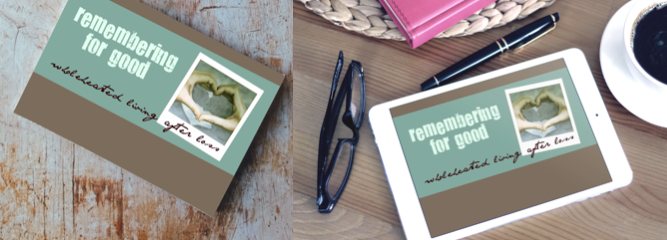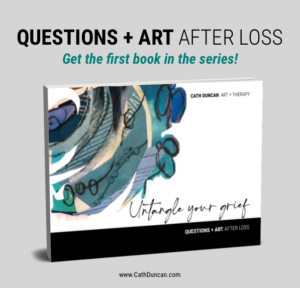The word “closure” is a popular word that gets bandied around when we’re talking about loss and grieving. It was popularized by Kubler-Ross in her theory of the 5 stages of grieving and more recently has been called into question by George Bonano and other mental health practitioners working in the field of bereavement. (Bonano’s book, “The Other Side Of Sadness” is a good read if you’re interested in reading more about this!)
Is there such a thing as “closure” in loss?
We talk about the word closure as though we all know what it means. It’s the “holy grail” of grieving – the place we need to get to after we’ve made our way through our grief. But the idea of “closure” is poorly understood – nobody has really painted a clear picture or given a clear set of criteria for knowing that you’ve reached “closure” in your grieving.
And yet it’s a word that embodies very strong visual metaphors and suggestions for how we “should” deal with grief and loss. The word closure suggests a sense of closing off, cutting off, leaving behind. Synonyms for “closure” include: “end, conclusion, finish, closing, shutting, shutting down, termination, ending, cessation, finality, resolution, conclusiveness, definiteness, stoppage, stop…”
Do these words resonate with you? Are they words you want to use to describe your grief process and to tell the story of your relationship with your loved one or the dreams and hopes you’ve lost?
We have a natural tendency to want to close up, constrict and withdraw when we’re in pain. We do this physically, emotionally and socially, as a way to protect ourselves from further potential pain, so it’s understandable that the word closure might speak to that scared part of ourselves that’s looking for ways to batten up the hatches and protect itself from further disappointment, loss and trauma. Perhaps this is one of the reasons why Kubler-Ross’ term caught on so well in modern society?
We’re uncomfortable with ambiguity and mystery
The official definition of psychological closure is “… an individual’s desire for a firm solution as opposed to enduring ambiguity.”
How fascinating…
The difference between life and death must be one of the biggest gaps in the world, and both are still such a mystery. When death visits us, we’re reminded of everything we don’t know and can’t control – all the mysteries of what it means to be human. This reminder breaks our generalized illusions of certainty and we’re faced with so many unanswerable questions… why me? Why did this happen? Could I have done something to prevent it? Did s/he die in pain or peace? Where is s/he now? Could things have been different?”
The ambiguity and lack of certainty can be quite intolerable. That sense of groundlessness can reach into every area of our lives, making us doubt ourselves, misttrust others and fear for the worst. It’s no wonder that we then go looking for “firm solutions” that will end the ambiguity.
But what “firm solutions” could there possibly be that would address the loss of your loved one or dream?
What if there was another way?
What if we sought to become more comfortable with ambiguity and to find peace in the mysteries of life, rather than trying to seek a “firm solution” that re-establishes an illusion of certainty? What if we decided that we could make the meaning up ourselves and pursued an open, ongoing creative conversation and an ever-evolving story, rather than chasing after certainty, right and wrong, and places to lay blame? What if we allowed our desire for expansion (can we even call it love?) to lead our choices, instead of our self-protective, constrictive fear?
What if the “goal” of grieving was opening instead of closure?
Loss can open us to so much that we never noticed or experienced before, if we choose to pursue wholehearted living and a sense of “opening” instead of fear and “closure.” Here are some of the many things that loss has opened up in my life:
- I have a much deeper appreciation for the love and support of my friends and family
- I have a much deeper understanding of other people’s pain, and how I can support them through their pain, along with a much greater capacity to do so.
- I have a much closer relationship with my parents than I ever had.
- I have clearer priorities. I have a greater ability to recognize what really matters and not worry about the little stuff. I’m less willing to compromise on what’s important to me. I worry much less about what other people think of the choices I make.
- I have a much greater appreciation of the healing power of connection. I understood this intellectually before but now I have real experience of it, an embodied understanding.
- I’ve become aware of the negative impact of shame in the grieving process, and the importance of overcoming shame so you can heal.
- I have a much greater capacity for love than I ever imagined possible.
- I have a closer relationship with my husband, Andy.
- I have a greater appreciation for my health. For the first time in my life, I’ve come to realize that my body is incredibly precious – it’s the only way that I get to experience the world, and I need to look after it with great care. Since I “got” this understanding, it’s been easy for me to make significant changes – like completely quitting sugar and grains, and exercising regularly.
- I have a much greater appreciation of my resilience and ability to survive hardship. My resilience was pretty much untested before, so I didn’t have the confidence of experience and evidence. While I have a lot of fear of loss still, on a deeper level I’m more grown up and confident in myself than I ever was before.
Here’s my commitment. Rather than seeking “closure,” I’m seeking “opening.” I want to live through and with all of my loves and losses with an open heart, an open mind and open hands. I want to be fully open to feel all the feelings and to learning all of the lessons. I want to be fully open to being changed by it. And I want to be fully open to letting loss add to my life and letting my service and contribution flow from all of the ways that loving and losing has changed me.
What about you?
Would you like guidance to explore and heal your grief?
I’ve put together a 35-page grief “workbook” for you; an introduction to Remembering For Good and living wholeheartedly after loss. Learn more about the Remembering For Good grief workbook.
The first book in the QUESTIONS + ART AFTER LOSS series, Untangle Your Grief is a beautiful 65-page book of artful questions and creativity-sparking art prompts to help you to create meaning, belonging, and hope after loss.




Thank you for this post. It means a lot to me, as one who has just been able to start framing the words ‘I forgive you’ in relation to a friend who passed from complications related to anorexia. To be honest, I’m not sure why I feel that I need to forgive her, but I’ve been so darned angry since she went in January that something has to come. I’d also like to take that vow –
I want to live through and with all of my loves and losses with an open heart, an open mind and open hands. I want to be fully open to feel all the feelings and to learning all of the lessons. I want to be fully open to being changed by it. And I want to be fully open to letting loss add to my life and letting my service and contribution flow from all of the ways that loving and losing has changed me.
Casey B
@Casey B Hi Casey! Sorry to have taken so long to reply… I installed this clever comment thing that links to Facebook but didn’t set it to notify me when people comment so I only found your comment now 🙁
Thank you for reading and for sharing a bit about your own journey in grieving and opening up your heart, mind and hands. Big love to you.